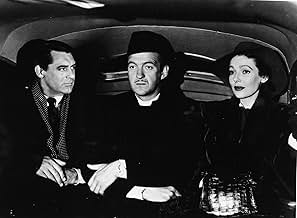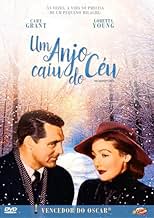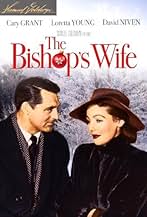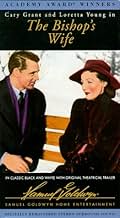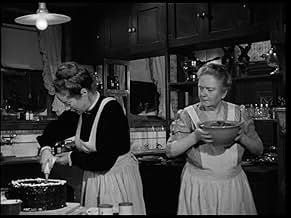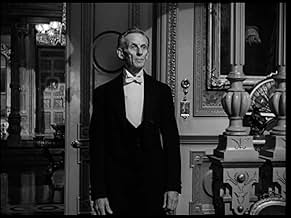Un elegante ángel viene a la Tierra para ayudar a un obispo episcopaliano y a su esposa en su intento de recaudar dinero para la nueva iglesia.Un elegante ángel viene a la Tierra para ayudar a un obispo episcopaliano y a su esposa en su intento de recaudar dinero para la nueva iglesia.Un elegante ángel viene a la Tierra para ayudar a un obispo episcopaliano y a su esposa en su intento de recaudar dinero para la nueva iglesia.
- Dirección
- Guionistas
- Elenco
- Ganó 1 premio Óscar
- 4 premios ganados y 4 nominaciones en total
- Mrs. Ward
- (as Ann O'Neal)
- Defense Captain
- (as Bobby Anderson)
Opiniones destacadas
But like "Groundhog Day", the surface simplicity is misleading, as this is an allegorical tale about the importance of getting outside ourselves and taking steps to escape the ruts of our day-to-day lives; i.e. finding a better way of living. Dudley works a few minor heavenly miracles but his real power is as a cheerleader and personal guide. No need to be an angel to exercise this kind of positive influence on others.
Dudley the angel comes to earth to help a Bishop (David Niven) juggle his professional and marital commitments, the conflict being that his priorities have changed since his promotion from the priest of a struggling parish. Only the bishop knows that Dudley is other than human and it takes most of the film before he is totally convinced. Meanwhile his wife and many others in the town are swept up by Dudley's charms. The Bishop is pre-occupied with securing funding for constructing a new cathedral but begins to catch on that Dudley and his wife are getting along so well that the unimaginable could occur-the angel stealing his wife.
If only one word could be used to describe "The Bishop's Wife" it would be subtle. The special effects are minimalist but effective, the careful framing and lighting of Gregg Toland's ("Citizen Kane") black and white cinematography, the tentative steps title character Julia (Loretta Young) takes as she starts to experience happiness again, and the slow realization by Bishop Henry of how far he has drifted from what matters the most.
The unity and subtlety is best illustrated in the scene of Henry walking up the sidewalk towards the Professor's (Monty Wooley) apartment. Although a few minutes from the end, this is actually the film's climax as Henry is finally confronting himself. As he walks forward the dark screen begins to get brighter; in step with his progress toward spiritual change and discovery is the end of his physical journey. He moves symbolically (and literally) toward the light.
Rounding out the strong cast are James Gleason (Max Corkle in "Here Comes Mr. Jordan") Elsa Lanchester, and Gladys Cooper. Henry and Julia's young daughter is played by Karolyn Grimes (Zuzu in "It's a Wonderful Life").
A nice thing is that while the film's "little" miracles are done on screen they are interwoven into the fabric of the story instead of dominating a scene. This casualness fits the tone of the film as does the occasional satirical line. The most memorable conversation is Cooper's demand (she is pledging money for the new cathedral) that the George figure in the proposed "St. George and the Dragon" stained glass window be made to resemble her late husband. Then Niven (deadpan) asks her whom she wants the dragon to resemble.
There will be a few who do not enjoy this film but I recommend it to anyone who wants a nice holiday film, or who is interested in a relatively deep allegorical tale of one's capacity to be a positive influence on others, or who just wants to see a truly awesome example of technical film-making.
Then again, what do I know? I'm only a child.
The angel Dudley, a choir-conducting, ice-skating, harp-thrumming omnipotent being, comes clean with a dubious Henry of his mission and poses as his new assistant, squires Henry's neglected wife Julia (Young) to recollect her fondest memory, charms the entire household including the high-pitched housekeeper Matilda (Lanchester), Henry's prim secretary Mildred (Haden), and the Brougham's small daughter Debby (Grimes), also, convinces an atheist professor Wutheridge (Woolley) to finally knuckle down to write the history book he has been stalling ever since. Eventually, Dudley's mission is not to build a cathedral, the fund can be wisely disbursed to a more exigent need of its time, but to set Henry's derailed life back on track, right before the advert of Christmas.
But there is a hitch, predictably, Dudley develops a feeling for Julia, which raises the tension between him and Henry, who runs away with jealousy (no sagacious scribe to inject him with any scintilla of trust in his devoted wife), and it is all up to a virtuous Julia to pull the plug with a lachrymose face to adumbrate that Dudley's feeling is not unrequited, but bound by a wife's duty, however tempted, it is too sacrosanct for her to shuck that off, a moral lesson inculcated with a beguiling pretense of cinematic illusion.
While the three leads are deftly treading their designated paths with admirable expertise: Grant is particularly jaunty in Dudley's backhanded magickal tricks with an understated poker-face, Young radiates incredible bonhomie and saintliness and Niven, taking everything with a pinch of salt, perfectly offsets Grant's exuding charisma in his own sizzling pique, it is the witty special effects that mostly, gives the movie an endearing quality that weathers with the age and shifting ethos, a self-typing typewriter, a self-replenishing bottle of sherry and a fully-bedecked Christmas tree, it is indeed, small wonders that save the day in Henry Koster's vintage heart-warmer ensconced as a go-to holiday classic with wholesome contentment.
Cary Grant as Dudley the Angel has a charm that transcends his role.
When he enters a room his presence fills the screen -- you know he is there even if you cannot always see him.
Loretta Young (who was a last minute replacement) is positively luminescent when she gazes into Dudley's face.
This goes for Elsa Lanchester and Gladys Cooper (the staff at the Bishop's house) too -- they have absolute adoration in their countenance. Not hard to do with Cary Grant I am sure -- but they take it to the spiritual level.
David Niven gives just the right amount of disbelief and cynicism as the Bishop that may have lost his faith.
I have always enjoyed performances by Monty Wooley and again he is perfectly cast as the self-described "has-been scholar."
The special effects are wonderful for a time (1947) when special effects were pretty much in their infancy.
Movie books classify "The Bishop's Wife" as a fantasy -- but there is so much more there than that.
It is a love story, a comedy, a drama and an all around inspiring film.
"Peace on Earth; good will towards men."
¿Sabías que…?
- TriviaOriginally Cary Grant played the bishop and David Niven the angel. When original director William A. Seiter left the film, Henry Koster replaced him and viewed what had been shot so far. He realized that the two were in the wrong roles. It took some convincing because Grant wanted the title role of the Bishop. He eventually accepted the change and his role as the angel was one of the most widely praised of his career.
- ErroresObvious stunt double when Dudley shows Julia how he can spin on the ice; he appears shorter and seems to be wearing dark-rimmed glasses.
- Citas
[last lines]
Henry Brougham: Tonight I want to tell you the story of an empty stocking. Once upon a midnight clear, there was a child's cry. A blazing star hung over a stable and wise men came with birthday gifts. We haven't forgotten that night down the centuries; we celebrate it with stars on Christmas trees, the sound of bells and with gifts. But especially with gifts. You give me a book; I give you a tie. Aunt Martha has always wanted an orange squeezer and Uncle Henry could do with a new pipe. We forget nobody, adult or child. All the stockings are filled... all that is, except one. And we have even forgotten to hang it up. The stocking for the child born in a manger. It's his birthday we are celebrating. Don't ever let us forget that. Let us ask ourselves what he would wish for most... and then let each put in his share. Loving kindness, warm hearts and the stretched out hand of tolerance. All the shining gifts that make peace on earth.
- Versiones alternativasAlso available in a computer colorized version.
- ConexionesFeatured in The Soundman (1950)
Selecciones populares
Detalles
- Fecha de lanzamiento
- País de origen
- Idiomas
- También se conoce como
- The Bishop's Wife
- Locaciones de filmación
- Loring Park, Minneapolis, Minnesota, Estados Unidos(snowball fight scene)
- Productora
- Ver más créditos de la compañía en IMDbPro
Taquilla
- Total a nivel mundial
- USD 44
- Tiempo de ejecución1 hora 49 minutos
- Color
- Relación de aspecto
- 1.33 : 1
Contribuir a esta página



